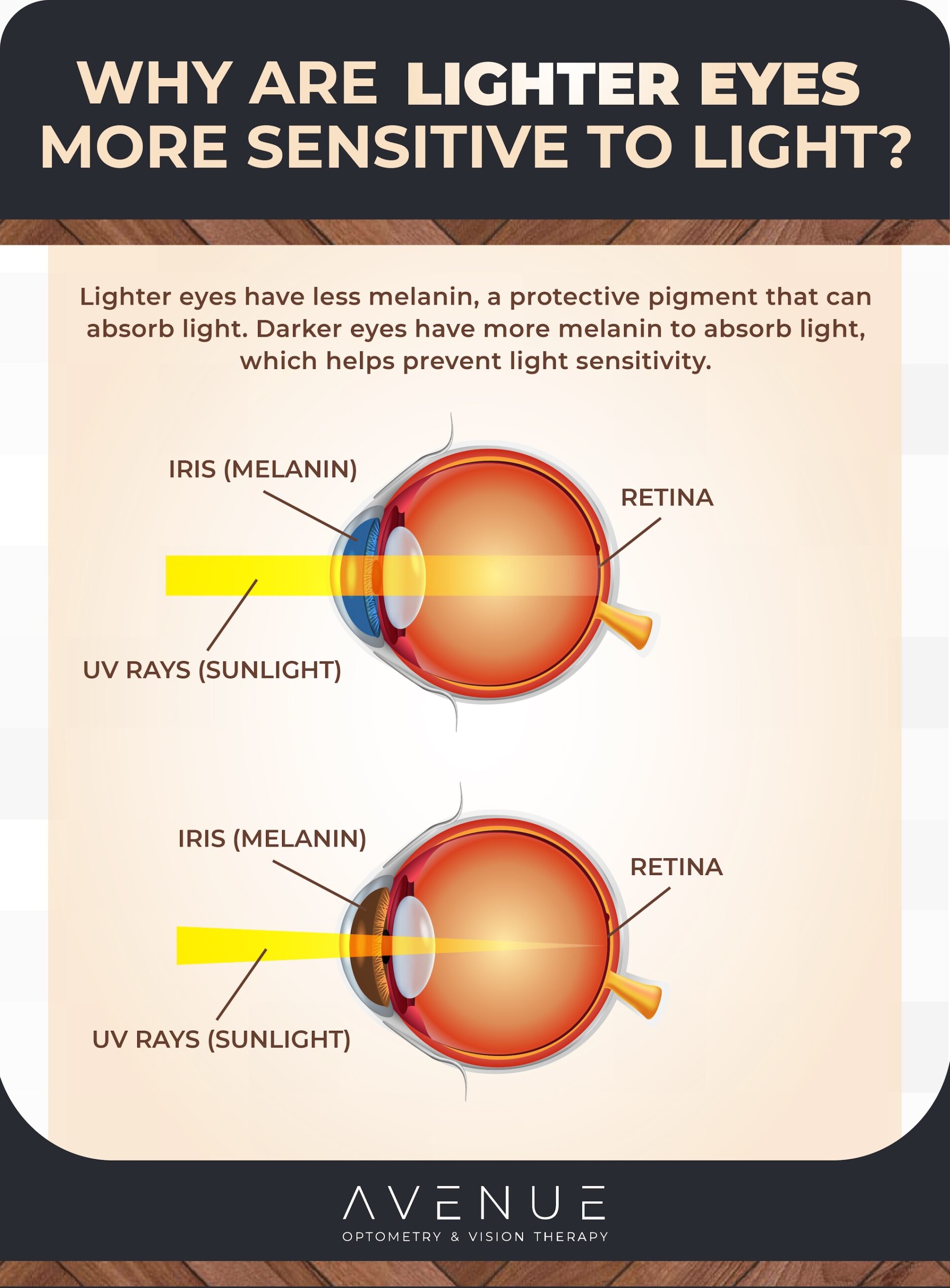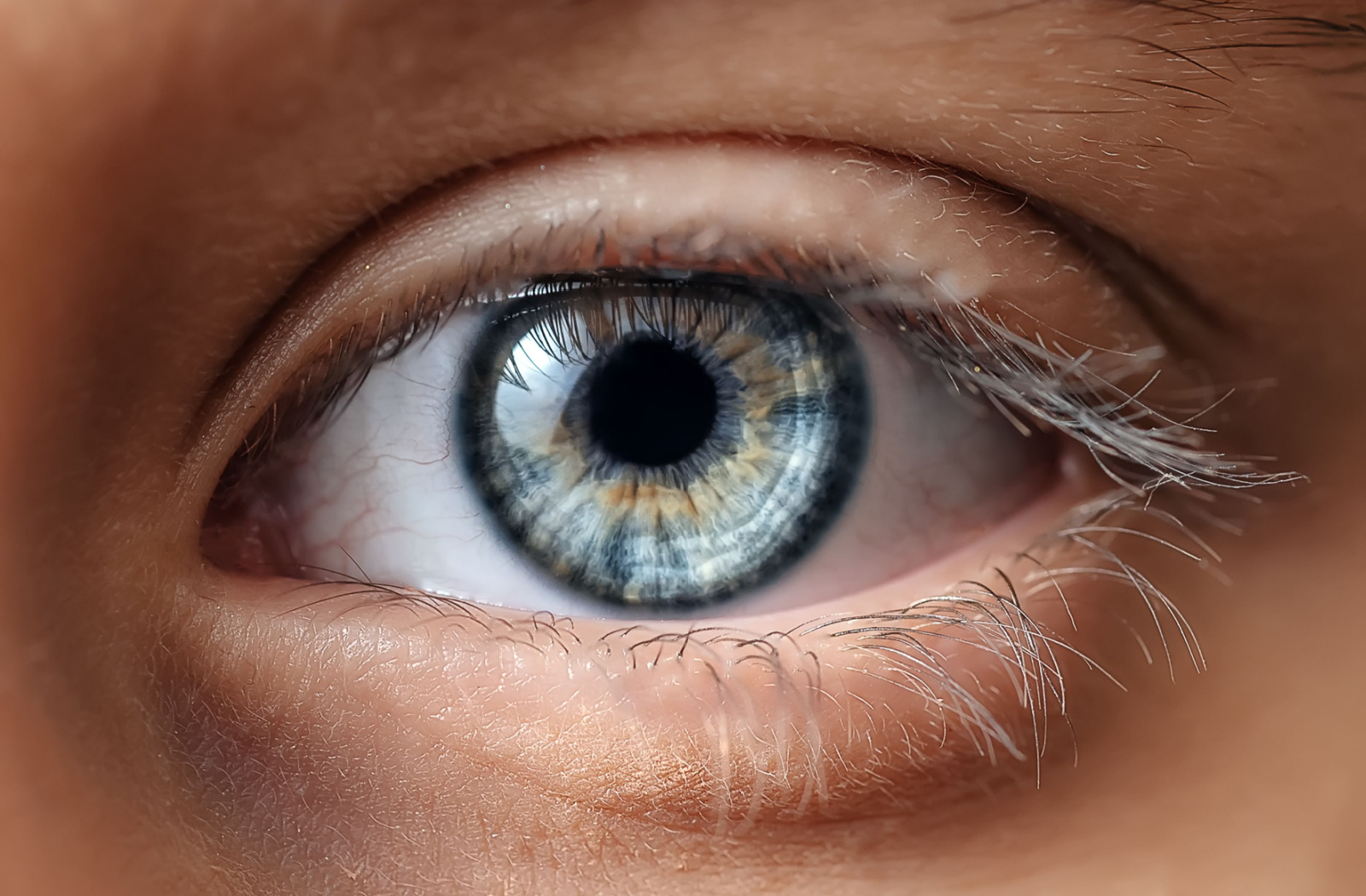Your eye colour can affect more than just which frames you choose for your glasses. Eye colour has as close a connection with overall eye health as many other parts of your eyes, and the colour of your unique eyes can have several interesting effects.
It’s true that people with a lighter eye colour, such as blue, green, or hazel, may experience more light sensitivity because they have less protective pigment in their eyes. However, a light eye colour is not the only cause of photophobia (light sensitivity), and those with lighter eyes are not the only people whose eye health may be affected by their eye colour.
Each pair of eyes is unique, and understanding the specific health and needs of your eyes often starts with an eye exam. During a comprehensive eye exam, your eye doctor can help you determine the cause of light sensitivity and evaluate your risk for other eye diseases and conditions.
How Does Eye Colour Affect Eye Health?
Because people with lighter eyes have less protective pigment to stop ultraviolet rays from the sun, their risk of experiencing damage from UV exposure may also be higher, including some rare eye cancers, such as ocular melanoma.
People with brown eyes may have a lower risk of developing AMD (age-related macular degeneration), a lower risk of developing certain eye cancers, and a lower risk of experiencing other eye conditions. However, those with brown eyes may also experience a higher risk of cataracts.
What Determines Your Eye Colour?
From a genetic perspective, your eye colour is thought to be determined by a combination of genes inherited from your parents. From a biological perspective, your eye colour is determined by the amount of melanin in your iris.
Melanin is a pigment that absorbs light. Those whose eyes have more melanin also have darker eyes because their irises absorb more light. Those whose eyes have less melanin also absorb less light in their irises, so their irises appear with brighter colours like blue and green.

How Does the Sun Affect Eye Health?
The sun has an interesting relationship with eye health because it provides the light people need to see, but that same light can damage your eyes. UV radiation in sunlight can cause damage if you’re exposed to too much at once or increase your risk of developing certain conditions if you’re exposed to a lot over your lifetime.
The conditions associated with sunlight exposure include:
- Photokeratitis: Photokeratitis is like a sunburn on your eyes and shares many of the symptoms that accompany dry eyes, such as redness, eye pain, and blurred vision.
- Pterygium: Pterygium, also sometimes called surfer’s eye, is a growth on your eye that can cause dryness and changes to your vision.
- Cataracts: Cataracts are often an age-related condition and your risk of developing cataracts can increase as you’re exposed to more and more sunlight throughout your lifetime.
- AMD (Age-Related Macular Degeneration): AMD is a condition that affects your central vision and can cause vision loss.
What Causes Light Sensitivity?
There are many conditions that can cause light sensitivity—from dry eyes to concussions. If you’re experiencing increased light sensitivity, that could be a sign that something new is affecting your vision and eye health.
Some of the common issues that can cause light sensitivity include:
- Dry eyes
- Conjunctivitis (pink eye)
- Corneal abrasions (eye injuries)
- Viral infections that cause encephalitis
- Head injuries
You should speak with your eye doctor to get a clear understanding of what could be causing increased light sensitivity. If you experience severe light sensitivity as a result of an eye injury or head injury, you should seek prompt emergency eye care or visit a nearby urgent care centre.

How Can You Protect Your Eyes from the Sun?
Sunglasses and wide-brim hats are 2 great options for protecting your eyes from UV radiation. When you’re choosing sunglasses, look for a pair that offers full UVA and UVB protection. Sunscreen can also be vital for protecting the skin around your eyes.
Shielding your eyes from sunlight is important for seeing clearly on sunny days, but it’s also important for reducing your lifetime exposure to UV radiation and limiting your risk of developing conditions like cataracts and AMD.
Why Does Bright Light Make You Sneeze?
If you sneeze because of bright light, that’s actually not caused by light sensitivity. At least, not the same type of light sensitivity that can affect your eyes. Light-induced sneezing is caused by a condition known as a photic sneeze reflex—or sometimes, autosomal dominant compelling helio-ophthalmic outburst (ACHOO syndrome).
A photic sneeze reflex is generally considered a genetic condition, although it may be possible to develop ACHOO syndrome over time. Some researchers have also identified a link between sneezing and sensations in your optic nerve that may cause light-induced sneezing.
Talk to an Eye Doctor About Light Sensitivity
Because light sensitivity can have so many possible causes, it’s important to speak with an eye doctor when it affects your vision. Through an eye exam, we can find the cause of light sensitivity and help you determine your options for treatment.Book an appointment at Avenue Optometry & Vision Therapy to get a thorough, clear understanding of your eye health.




